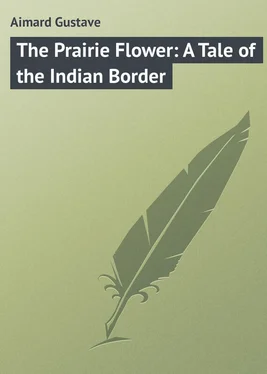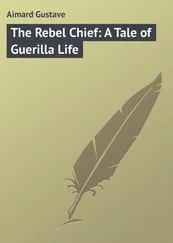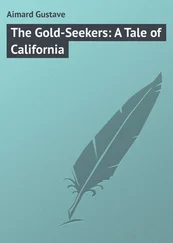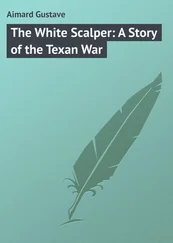Gustave Aimard - The Prairie Flower - A Tale of the Indian Border
Здесь есть возможность читать онлайн «Gustave Aimard - The Prairie Flower - A Tale of the Indian Border» — ознакомительный отрывок электронной книги совершенно бесплатно, а после прочтения отрывка купить полную версию. В некоторых случаях можно слушать аудио, скачать через торрент в формате fb2 и присутствует краткое содержание. Жанр: foreign_prose, на английском языке. Описание произведения, (предисловие) а так же отзывы посетителей доступны на портале библиотеки ЛибКат.
- Название:The Prairie Flower: A Tale of the Indian Border
- Автор:
- Жанр:
- Год:неизвестен
- ISBN:нет данных
- Рейтинг книги:4 / 5. Голосов: 1
-
Избранное:Добавить в избранное
- Отзывы:
-
Ваша оценка:
- 80
- 1
- 2
- 3
- 4
- 5
The Prairie Flower: A Tale of the Indian Border: краткое содержание, описание и аннотация
Предлагаем к чтению аннотацию, описание, краткое содержание или предисловие (зависит от того, что написал сам автор книги «The Prairie Flower: A Tale of the Indian Border»). Если вы не нашли необходимую информацию о книге — напишите в комментариях, мы постараемся отыскать её.
The Prairie Flower: A Tale of the Indian Border — читать онлайн ознакомительный отрывок
Ниже представлен текст книги, разбитый по страницам. Система сохранения места последней прочитанной страницы, позволяет с удобством читать онлайн бесплатно книгу «The Prairie Flower: A Tale of the Indian Border», без необходимости каждый раз заново искать на чём Вы остановились. Поставьте закладку, и сможете в любой момент перейти на страницу, на которой закончили чтение.
Интервал:
Закладка:
"Hum!" he began, "I think you said it was past twelve?"
"About a quarter past," the hunter answered.
The Count consulted, his watch.
"Quite right," he said.
"Oh!" the hunter continued, pointing to the sun, "that is the only true clock; it never goes too fast or too slow, for Heaven regulates it."
The young man bowed his head affirmatively.
"We will start," he said.
"For what good at this moment?" the Canadian asked. "We have nothing pressing before us."
"That is true; but are you sure we have not lost our way?"
"Lost our way!" the hunter exclaimed, with a start of surprise, almost of anger; "no, no, it is impossible. I guarantee that within a week we shall be on Lake Itasca."
"The Mississippi really runs from that lake?"
"Yes; for, in spite of what is asserted, the Missouri is only the principal branch of that river: the savants would have done better to assure themselves of the fact, ere they declared that the Mississippi and Missouri are two separate rivers."
"What would you have, Bright-eye?" the Count said, laughingly. "Savants are the same in all countries; being naturally indolent, they rely on one another, and hence the infinity of absurdities they put in circulation with the most astounding coolness."
"The Indians are never mistaken."
"That is true; but then the Indians are not savants."
"No; they see for themselves, and only assert what they are sure of."
"That is what I meant," the Count replied.
"If you will listen to me, Mr. Edward, we will remain here a few hours longer to let the great heat pass off, and when the sun is going down we will start again."
"Very good; let us rest then. Ivon appears to be thoroughly of our opinion, for he has not stirred."
The Count had risen; before sitting down, he mechanically cast a glance on the immense plain which lay so calmly and majestically at his feet.
"Eh!" he suddenly exclaimed, "what is that down there? – look, Bright-eye."
The hunter rose and looked in the direction indicated by the Count.
"Well – do you see nothing?" the young man remarked.
Bright-eye, with his hand over his eyes to shield them from the glare of the sun, looked attentively without replying.
"Well?" the Count said, at the expiration of a moment.
"We are no longer alone," the hunter answered; "there are men down there."
"How men? We have seen no Indian trail."
"I did not say they were Indians."
"Hum! I suppose at this distance it would be rather difficult to decide who they are."
Bright-eye smiled.
"You always judge from your knowledge obtained in the civilized world, Mr. Edward," he answered.
"Which means – ?" the young man said, intensely piqued at the observation.
"That you are always wrong."
"Hang it, my friend! You will allow me to observe, all individuality apart, that it is impossible at this distance to recognize anybody. Especially when nothing can be distinguished, save a little white smoke."
"Is not that enough? Do you believe that all smoke is alike?"
"That is rather a subtle distinction; and I confess that to me all smoke is alike."
"That's where the error is," the Canadian continued, with great coolness, "and when you have spent a few years in the prairie you will not be deceived."
The Count looked at him attentively, convinced that he was laughing at him; but the other continued, with the utmost calmness —
"What we notice down there is neither the fire of Indians nor of hunters, but is kindled by white men, not yet accustomed to a desert life."
"Perhaps you will have the goodness to explain."
"I will do so, and you will soon allow that I am correct. Listen, Mr. Edward, for this is important to know."
"I am listening, my good fellow."
"You are not ignorant," the hunter continued imperturbably, "that what is conventionally called the desert is largely populated."
"Quite true," the young man said, smiling.
"Good; but the enemies most to be feared in the prairies are not wild beasts so much as men; the Indians and hunters are so well aware of this fact that they try as much as possible to destroy all traces of their passage and hide their presence."
"I admit that."
"Very good; when the Redskins or the hunters are obliged to light a fire, either to prepare their food or ward off the cold, they select most carefully the wood they intend to burn, and never employ any but dry wood."
"Hum! I do not see the use of that."
"You will soon understand me," the hunter continued; "dry wood only produces a bluish smoke, which is difficult to detect from the sky, and this renders it invisible at a short distance; while on the other hand, green wood, through its dampness, produces a white dense smoke, which reveals for a long distance the presence of those who kindle it. This is the reason why, by a mere inspection of that smoke, I told you just now that the people down there were white men, and strangers, moreover, to the prairie, else they would have employed dry wood."
"By Jove," the young man exclaimed, "that is curious, and I should like to convince myself."
"What do you intend doing?"
"Why, go and see who are the people that have lighted the fire."
"Why disturb yourself, since I have told you?"
"That is possible; but what I propose doing is for my personal satisfaction; since we have been living together you have told me such extraordinary things, that I should like, once in a way, to know what faith to place in them."
And not listening to the Canadian's observations, the young man aroused his servant.
"What do you want, my lord?" the latter said, rubbing his eyes.
"The horses, and quickly too, Ivon."
The Breton rose and bridled the horses; the Count leaped into the saddle; the hunter imitated him, though shaking his head; and the three trotted down the hill.
"You will see Mr. Edward," Bright-eye said, "that I was in the right."
"I am certain of it; still I should like to judge for myself."
"If that is the case, allow me to go in front; for, as we do not know with what people we may have to deal, it is as well to be on our guard."
The Canadian headed the party. The fire the Count had seen from the top of the hill was not so near as he supposed, the hunter was incessantly compelled to get out of the way of dense thickets which barred the way, and this lengthened the distance; so that they took nearly two hours in reaching the spot they were steering for. When they had at length arrived within a short distance of the fire which had so perplexed M. de Beaulieu, the Canadian stopped, making his companions a sign to imitate him. When they had done so, Bright-eye got down, gave his horse's bridle to Ivon, and taking his rifle in his hand, said, "I am going on a voyage of discovery."
"Go," the young man replied, laconically.
The Count was a man of tried courage; but since he had been in the prairie he had learned one thing, that courage without prudence is madness in the presence of enemies who never act without calling craft and treachery to their aid; hence, gradually renouncing his chivalrous ideas, he was beginning to adopt the habits of the desert, knowing very well that in an ambuscade the advantage nearly always remains with the man who first discovers the enemies whom chance may bring in his way. The Count, therefore, patiently awaited the hunter's return, who had silently glided among the trees, and disappeared in the direction of the fire. At the end of about an hour the shrubs shook, and Bright-eye reappeared at a point opposite to that where he had started. The old wood ranger had been considerably bothered by the apparition of the distant fire which the Count pointed out to him from the top of the hill. So soon as he was alone, putting in practice the axiom, that the shortest road from one point to another is a curved line, the truth of which is proved in the prairie, he had taken a wide circuit, in order to come, if it were possible, on the trail of the men he wished to observe, and from it discover who they really were.
Читать дальшеИнтервал:
Закладка:
Похожие книги на «The Prairie Flower: A Tale of the Indian Border»
Представляем Вашему вниманию похожие книги на «The Prairie Flower: A Tale of the Indian Border» списком для выбора. Мы отобрали схожую по названию и смыслу литературу в надежде предоставить читателям больше вариантов отыскать новые, интересные, ещё непрочитанные произведения.
Обсуждение, отзывы о книге «The Prairie Flower: A Tale of the Indian Border» и просто собственные мнения читателей. Оставьте ваши комментарии, напишите, что Вы думаете о произведении, его смысле или главных героях. Укажите что конкретно понравилось, а что нет, и почему Вы так считаете.












